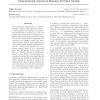109 search results - page 7 / 22 » Bayesian Model Selection when the Number of Components is Un... |
ICML
2007
IEEE
14 years 8 months ago
2007
IEEE
We consider the problem of multi-task reinforcement learning, where the agent needs to solve a sequence of Markov Decision Processes (MDPs) chosen randomly from a fixed but unknow...
CVPR
2003
IEEE
14 years 9 months ago
2003
IEEE
This paper presents an algebro-geometric solution to the problem of segmenting an unknown number of subspaces of unknown and varying dimensions from sample data points. We represen...
KDD
2004
ACM
14 years 1 months ago
2004
ACM
Mark-recapture models have for many years been used to estimate the unknown sizes of animal and bird populations. In this article we adapt a finite mixture mark-recapture model i...
ICML
2005
IEEE
14 years 8 months ago
2005
IEEE
The conditional distribution of a discrete variable y, given another discrete variable x, is often specified by assigning one multinomial distribution to each state of x. The cost...
IJCNN
2006
IEEE
14 years 1 months ago
2006
IEEE
— From the Bayesian Ying-Yang (BYY) harmony learning theory, a harmony function has been developed for finite mixtures with a novel property that its maximization can make model...


